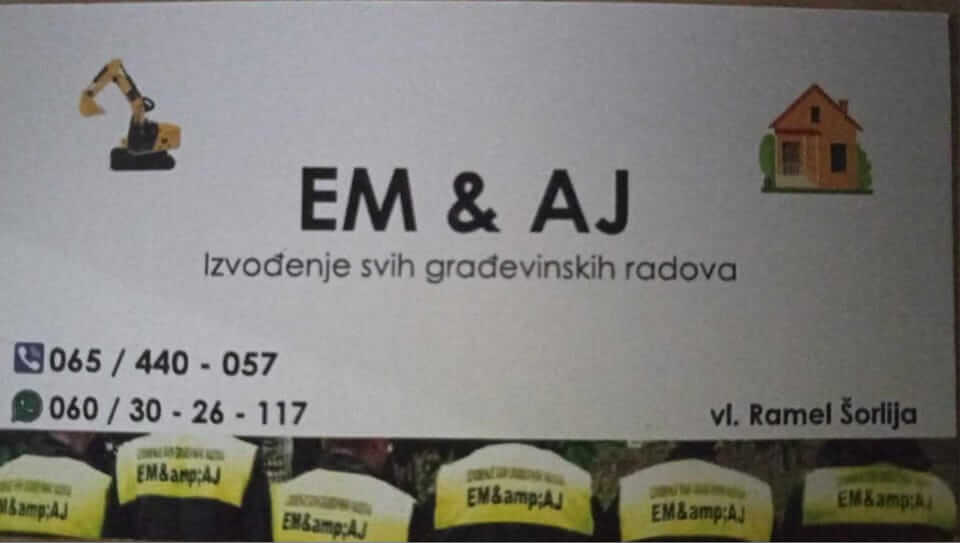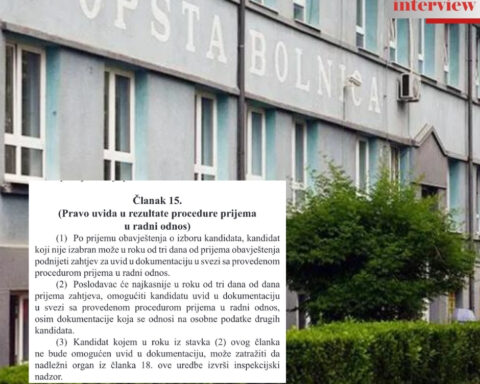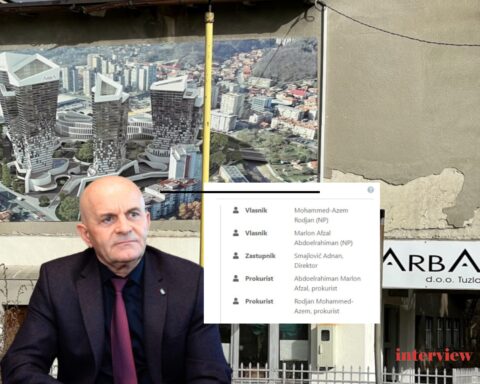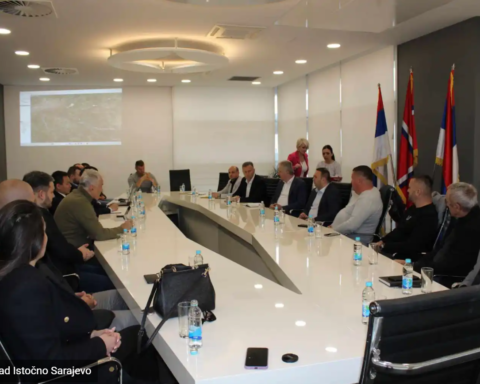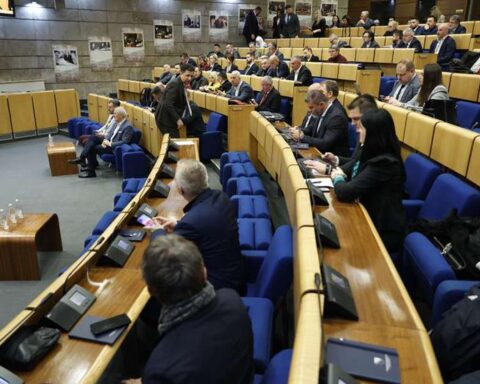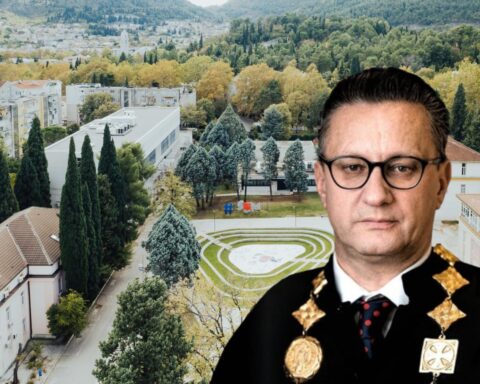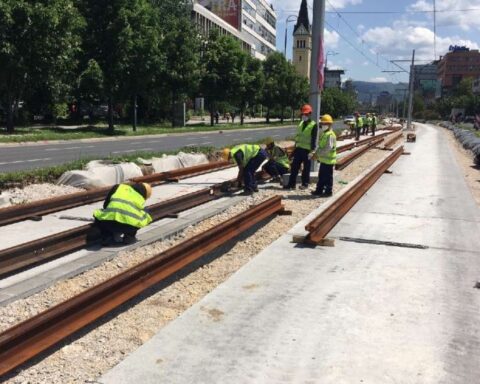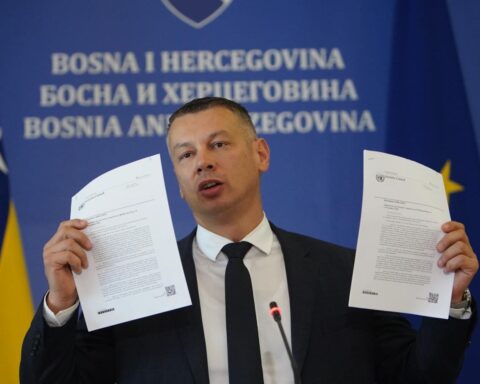Judicial officer Ramel Šorlija, who posed as a construction worker, painter, tiler, or bricklayer, and owner of a non-existent construction company, deceived citizens in at least five cases by taking money for pre-agreed works that he often did not adequately complete or left unfinished. Citizens most commonly paid for the work in cash, which was never refunded even though the jobs were not completed.
Damir Zulić from Vogošće is one of the deceived citizens for whom building a garage turned into a nightmare. Besides Zulić, at least five other individuals, according to the information obtained, are victims of a well-organized scam orchestrated by judicial officer Ramel Šorlija. For years, he has been taking money for construction works that he performs poorly and does not complete, refusing to refund the money. When defrauded citizens demand a refund, Šorlija resorts to manipulation and threats. Some of the deceived citizens we contacted refused to speak publicly about the scam out of fear.
“He’s a policeman, backed by the state”, says one of the deceived citizens who declined to speak to Infoveza journalists.
Šorlija has been finding his victims for years on the Facebook platform in various groups containing the word “repairman” in their name. For our interlocutors, Šorlija is anything but a repairman.
Our first interviewee says he found Šorlija through the Facebook group “Majstori Sarajevo”, (translation: Repairmen Sarajevo) based on a recommendation.
“I contacted him, and we agreed that he would build a garage for me. The price was 15,000 KM, which I paid as the work progressed. I paid him in cash”, says Zulić.
After Šorlija, or rather the group of people he calls his workers, built the garage and poured the upper slab, for which he hadn’t planned a strong and large enough beam that later cracked, problems arose.
“He didn’t come to the construction site, but only sent workers, whom nobody supervised. The beam on the garage was shortened by the workers to save on concrete. And of course, such a structure didn’t hold, and it collapsed”, Zulić adds.
After the structure of the garage collapsed, the contractor called Šorlija, who presented himself as the owner of the company “Em & Aj”, which cannot be found in any business registry. He asked Šorlija to make repairs and pour an additional beam to strengthen the building.
“He agreed but demanded that I pay for the repairs, claiming that I was at fault and not him as the contractor. That’s when I told him that he wouldn’t continue the work unless he repaired it”, Zulić recounts.
Šorlija continued the work. When it came to building the roof for which Zulić had also paid the last 8,000 out of the agreed 15,000 KM, he noticed that the roof was crooked.
Realizing that the building was not done properly and according to the agreement, Zulić demanded that the work be stopped and that he be refunded. Zulić insisted that he be refunded at least the money for the beam, which cost 4,500 KM.
“Part of the money was returned to me after numerous calls and insistence. He still owes me the remainder, over 3,000 KM just for the beam”, says Zulić, who later was forced to hire another company and pay for the remaining work again.
Nevzeta Zulić, a war-time teacher, psychotherapist, and writer who has been living in Germany for years, had hoped to come to her family home in Vogošća this summer, which was supposed to be renovated. It was supposed to cost her a total of 25,000 euros, but the final bill was almost doubled. The scam by Ramel Šorlija cost her the most. Out of the agreed 25,000 euros (for the construction of the garage, complete renovation of the ground floor of the house, installation of laminate flooring on the second floor, construction of the facade, installation of gutters on the entire house, and drainage around the house), she paid a total of 21,500 euros. The payments were made on multiple occasions, each time after Šorlija pressured her to do so, exclusively through Western Union.
When Šorlija asked her for the payment, Nevzeta Zulić didn’t suspect much; she sent the money hoping it would be used for its intended purpose.
“I sent everything to his personal name, constantly. He put pressure on us like that: send money, send money, we don’t have materials, we can’t continue working, he constantly put us in those situations, threatened us that he would stop the work if we didn’t give him money. It’s terrible. Then I wrote a message and said – what a shame, you are a father of children to be a fraudster”, our interlocutor recounts, but her appeal to honesty was not of much use.



*evidence of payment to Šorlija’s personal account
Šorlija performed certain tasks, albeit poorly, while receiving money to create the illusion for the defrauded citizens that he was actually doing his job. When the clients decided to stop paying until the work was finalized, Šorlija would halt the work, considering the collaboration over. Some citizens wrote about this in the aforementioned groups. However, this didn’t stop him from constantly posting photos on the social media platform Facebook from the locations where he was working, intending to attract new clients.


“He stopped working; we said finish it and you’ll get the money. After that, he didn’t want to come anymore. Once he got the money, he slowed down with everything”, says Nevzeta Zulić. When she received information from relatives in Bosnia and Herzegovina that almost nothing had been done on the house despite having paid most of the money, she asked Šorlija for a refund, but in vain.
“He says he invested 21 thousand euros in it, but nothing was done. Now everything has to be removed and fixed from what he did. It’s pure fraud, it’s terrible, impossible for even a somewhat decent person to do. I told him – it’s shameful to work in the police and do such things. How can anyone keep him in the police while he conducts criminal activities and cheats honest people?” Nevzeta recounts.
Binasa Murić, a single mother of two, went through a similar scenario during her collaboration with Šorlija. Her interpretation of his behaviour is compatible with the statements of other interlocutors, so the conclusion is clear – Šorlija has a clear modus operandi. Complete the job as cheaply as possible, create the illusion of completed work, charge as much as possible above the agreed total price, and disappear.
Two years ago, Binasa wanted to install a new shower cabin for her mother, who has limited mobility. She was looking for a reliable craftsman who could help her. She posted an ad in a Facebook group, after which Šorlija soon contacted her.
Binasa knew what kind of work she wanted, but Šorlija tried to convince her of other options. After his insistence, she agreed, and Šorlija also offered constant offers of additional work whose value was far above market prices.
“He convinced me to buy some bottom part that costs 100 KM and some moulding, I don’t know why, and he would apply silicone one day, then come the next day to apply more silicone, and then even a third colour of silicone. Then I lost it; I had agreed with him to do the masonry work, maybe 2 square meters of tiles because he presented himself as a tiler, and he knows how to do it. He said he would install glass on one side for me, which he tried to sell to me for 600, 700 KM, but I saw that it cost 200 KM. Then there were excuses – oh, that’s not the right price”, Murić explains.
The same thing happened with changing the boiler. Šorlija tried to earn money through deception at every turn. He convinced clients that they needed additional materials, and when he saw initiative from the clients, he saw it as an opportunity for extra profit.
“The next thing he was supposed to do was buy me a device that is installed on the water supply to regulate water pressure in the house. There was a version for 30 and for 300 KM; I said, buy me the most expensive one because that’s really important to me. He told me he bought the most expensive one”, adds Binasa.
After he installed the device, Binasa went to a store that sells that type of equipment with the box and product declaration.
“I asked how much it costs, they told me 32 KM”, Murić adds.
The work in the bathroom soon proved to be inadequate, and Binasa believed that her mother, who has limited mobility, could be injured due to the floor in the toilet. She asked Šorlija for corrections, which he refused.
“I told him, call me, see, since you got all the money upfront and didn’t do anything as we agreed, you will return me at least 200 KM. And I gave him a deadline for that. Then he called me and said, do you think you can threaten me? I was so angry and busy with other things; I wanted to react, but I didn’t because my daughter-in-law came and said, for God’s sake, don’t do that, and I said okay, I won’t”, adds our interlocutor.
Police Officer Utilizes Position for Intimidation
Most of the interviewees we spoke with feel uncomfortable discussing Šorlija. They are uneasy about having to confront a police officer. Those who are not willing to talk are already scared and disappointed in justice. They are aware that Šorlija, as a judicial police officer, is more protected than them, and he highlights his permanent employment for two reasons: to establish authority and build trust because citizens think a police officer wouldn’t cheat them.
Parallel to the scams, Šorlija tarnished the reputation of the judicial police, for which he was disciplined three times from January 2022 to June 2023, mostly resulting in fines deducted from his salary. One of the published offences stated that by the decision of the Disciplinary Commission of the Judicial Police of the Federation of Bosnia and Herzegovina in 2023, Šorlija was found guilty of taking money from citizens in exchange for “legalizing” buildings, as previously reported by Detektor.

Disciplinary sanctions, source: Detektor.ba
Disciplinary sanctions and the testimonies of our interviewees suggest that Šorlija’s behaviour derogates the profession and violates some of the basic moral principles. Besides presenting himself as a person who owns a company, even though there is no registration data, and not issuing fiscal receipts, thus damaging the budget, Šorlija also violates other laws.
Article 74 of the Law on Judicial Police of the Federation of Bosnia and Herzegovina states that an officer “cannot engage in additional paid activities without the director’s approval”.
Although there is no evidence in the business registries that the company “Em & Aj” is registered, in an interview with Infoveza, Šorlija claims to have a registered company.
Regarding whether he is aware of the legal provision that as a judicial police officer he cannot engage in this type of activity without the director’s approval, Šorlija refused to comment.
At first, he refused to answer the questions, stating that they were “private matters”. After a few minutes, he returned the call, during which he was very unpleasant, speaking in an aggressive tone and using profanity.
“Why are you calling me if you have evidence?” Šorlija asked. We responded that we respected the journalistic rule of the other side, which further infuriated him.
“Where is your evidence, for f**** sake? What are you talking about? What the h*** arenyou talking about?” Šorlija continued.
He then insisted that we give him the address to come and collect the evidence, which we refused due to the aggressive tone and security risks. The conversation ended with the words: “F*** you and your evidence and your news agency”.
We emailed the Judicial Police of the Federation of Bosnia and Herzegovina. We asked them if they were aware of their employee Ramel Šorlija’s business.
“Given that the characteristics of the behaviour of the judicial police officer, as implied from your email, are contrary to positive regulations, the Judicial Police in the Federation of Bosnia and Herzegovina will immediately initiate and verify the claims made through the Sector for Professional Standards and Internal Control of the Judicial Police”, part of the response from the Judicial Police of the Federation of Bosnia and Herzegovina regarding questions about the illegal activities of their employee stated.
While awaiting the outcome of the internal review and the reactions of the relevant authorities such as the police and the prosecutor’s office, citizens are advised to thoroughly check the craftsmen they hire and inquire about them before making any agreements. It would certainly be wiser to request a fiscal receipt or other form of guarantee for the quality of the work performed so that, subsequently, in the case of poorly executed work, they could demand corrections in accordance with the Consumer Protection Law. Citizens must also be aware that by paying individuals without a contract, knowingly or unknowingly, they are supporting the informal economy.


